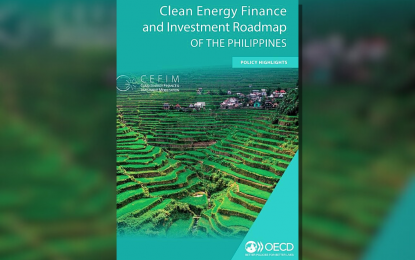
(Courtesy of OECD)
MANILA – A study of the Organisation for Economic Co-operation and Development (OECD) has revealed that the Philippines would need investments amounting to USD337 billion by 2040 to achieve clean energy goals.
On Thursday, OECD and the Department of Energy (DOE) launched the Clean Energy Finance and Investment Roadmap of the Philippines providing policy recommendations for the country to accelerate its clean energy goals.
The USD337 billion investments will help the Philippines achieve its goal of achieving a 50-percent share of renewables in the power mix and 24-percent economy-wide energy savings target.
“Developing a strong policy, regulatory, and investment environment is crucial to attract both domestic and international capital, aligning with the nation's clean energy ambitions,” the OECD noted.
The roadmap focuses on two sectors– offshore wind technology and energy efficiency.
“The Philippines ranked fourth globally among the most promising emerging markets for renewable investments, and that’s quite remarkable,” OECD deputy director Mathilde Menard said.
In her presentation, OECD policy analyst Ariola Mbistrova shared key recommendations to unlock finance and investments in offshore wind energy and energy efficiency technologies.
For offshore wind, policy recommendations include target setting for development plans; zone allocation for offshore wind go-to areas; one-stop-shop approach; grid networks and transmission planning; for expansion and upgrades; auction design to improve competition outcomes; offshore wind finance; and capacity building.
Mbistrova said investments and implementation of energy efficiency initiatives in the Philippines are moving slowly.
Key recommendations of the OECD to fast-track developments in energy efficiency include a harmonized implementation plan; public budget allocation for local government units; regulatory reforms; data collection and transparency; improved access to finance; and capacity building for local impact.
Under the roadmap, these recommendations are expected to be implemented by the second half of 2024.
In her opening remarks, DOE Undersecretary Rowena Cristina Guevara said addressing regulatory challenges and bureaucratic hurdles will encourage investments in clean energy projects in the country.
“We need to strengthen our mechanisms, monitor and evaluate our initiatives, and learn and relearn from both successes and setbacks to achieve our objectives,” Guevara said.
This roadmap is under the OECD’s Clean Energy Finance and Investment Mobilization (CEFIM), which is being funded by Australia, Canada, Denmark, Egypt, and Germany.
Aside from the Philippines, there are seven other countries benefiting from the CEFIM, including Colombia, Egypt, India, Indonesia, South Africa, Thailand, and Vietnam. (PNA)
